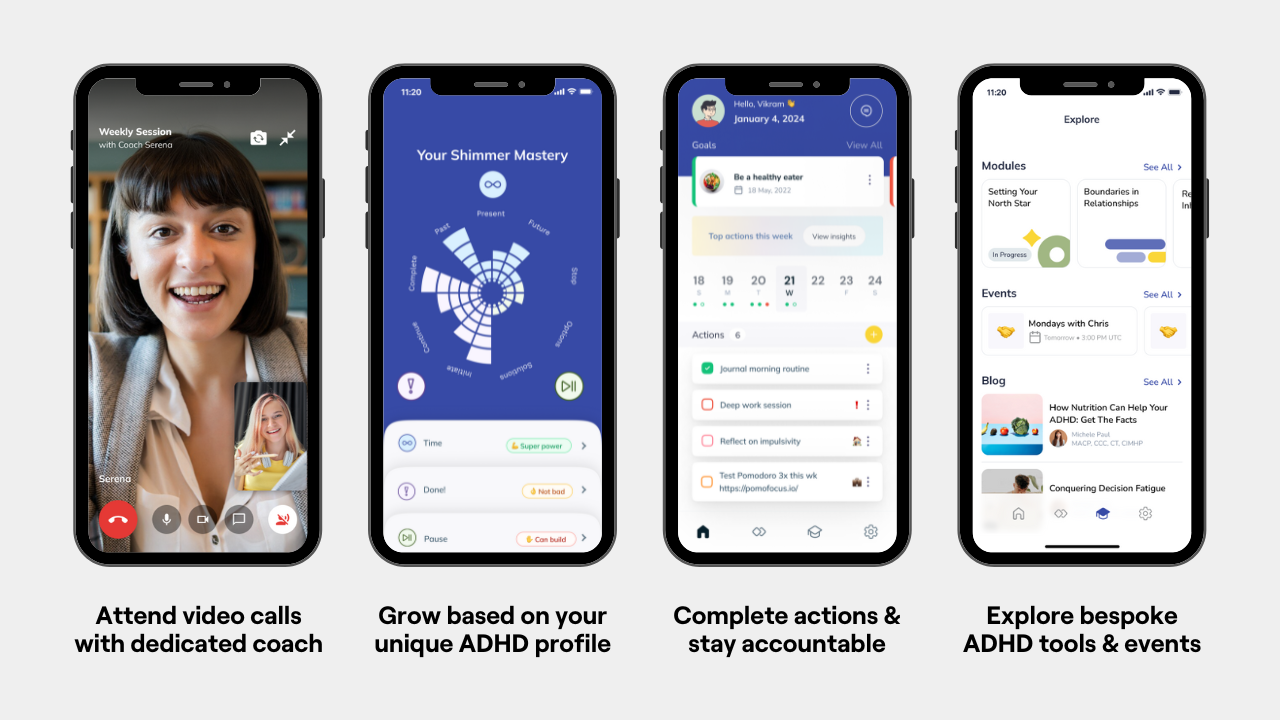 Shimmer is a platform online platform designed to help the 13 million American adults who have attention-deficit/hyperactivity disorder (ADHD) through coaching.
Shimmer is a platform online platform designed to help the 13 million American adults who have attention-deficit/hyperactivity disorder (ADHD) through coaching.
Its program, developed by ADHD experts, including from NYU and UCSF, makes coaching more affordable by taking sessions that once took hour and turning them into 15 minute mini or “bite-sized” live sessions, which are then paired with an accountability system. Memberships start at $99 per month, and includes weekly 15-minute video sessions.
Shimmer has seen 15,000 sessions facilitated in the last 12 months, served clients across the globe, and grown its coach base to over 30. And now it’s set to grow even bigger as it announced a $2.2 million seed funding round on Thursday co-led by Worklife Ventures and SeedtoB Capital. Koa Labs, Aglaé Ventures, and Gaingels also participated, bringing the company’s total funding to $3.5 million to date.
Since its launch in October 2022, demand and supply side trends the company had been seeing have only been increasing, Shimmer co-founder and CEO Chris Wang told VatorNews, including higher demand and diagnosis, with the percentage of adult women diagnosed doubling from 2020 to 2022, along with a stimulant shortage has been hitting globally.
“At Shimmer, in the last 14 months, we’ve uncovered a lot. We’re a learning machine,” she said.
“When we launched I said, ’10 years ago you couldn’t do asynchronous tasks in between sessions.’ Fast forward just one year and now with the wide scale adoption of AI, there are features we’ve launched and on our roadmap for 2024 that I can say ‘one year go, you couldn’t do that!’ which is a pretty incredible time to be building.”
That include introducing AI-enablement on the coach-side to automate their workflows. For example, post-session used to take up to 30 minutes but now, with LLMs and the ability to summarize notes, produce post-session actions and resources, it has been reduced to five minutes. Meanwhile, on the member-side, AI-enablement is used to to summarize sessions and draw out key insights.
In addition, Shimmer has also implemented body doubling and live events and other features on both coach and member sides.
The company has also updated its methodology, now that it has figured out what Wang calls, “the efficiency piece.”
“That was the easy one. We nailed that in a few months. We knew that the harder part would be to elevate the perception of coaching overall. We had some clinicians eager to send patients our way right away—they actually found out about us from their patients,” she said.
“Then we had other clinicians who have been burned by coaches in the past, meaning those with no training, no supervision, etc. We’re now knee deep tackling a bigger, more fun challenge of how do we leverage the latest science and evidence-base to institute a methodology at scale and prove outcomes.”
Now that it has this new funding, the company plans to expand its AI-focused product development. On the coach-side, Shimmer is using AI tools and workflows to not only make coaches more efficient but to actually make them better coaches. That means helping them remember things better, make connections, find the right resources, and take a more data-driven approach to support their coaching.
On the member-side, AI tools are being used to reduce the cognitive effort of engaging in coaching, and to personalize experiences to cater to different learning styles. The vision is that, in the near future, each person on Shimmer will have a completely different experience.
“We view AI as a tool to augment what humans, coaches in our case, do best, while supporting the tedious, non-essential tasks that are currently being performed by humans. To that end, AI will be first and foremost integrated on both current coach and member experiences,” said Wang.
The company also plans to launch a scientific study researching ADHD coaching outcomes under the auspices of leading universities in the United States and the United Kingdom, measuring both quality of life metrics, which reflects Shimmer’s methodology, and symptoms/impairment-related metrics for comparison of efficacy with other modalities.
“In coaching, unlike the medical/clinical field, we work with clients to increase quality of life. Coaching operates from the assumption that the clients are whole and resourceful. On the other hand, the medical/clinical field is deficit-driven and focuses on reducing symptoms and impairment. Both modalities/fields are necessary and complementary depending on the need of the client,” said Wang.
“An important distinction to make here is that ADHD coaching helps members work with their ADHD symptoms and create systems and learn tools to build a life they love. For example, if an ADHD symptom is not hindering a person with ADHD’s life and goals, these don’t need to be ‘fixed’ nor deemed a deficit.”
Finally, Shimmer plans to expand its services to companies building inclusive environments for their workforce, as the core of its mission is affordability, and ensuring those who need it the most are getting access. By shifting the burden of care from the consumer to the employer/payor, far more folks will be able to get consistent, sustainable support for their ADHD.
“Accessibility and affordability have always been cornerstones of our DNA, and in this next phase we’re excited to work/pilot with provider, payor, and employer partners to reduce, and eventually eliminate, the out of pocket cost for members to access ADHD coaching,” said Wang.
“ADHD coaching, and most coaching, used to be a modality that was extremely expensive and deemed as for the “elite,” like executives and athletes. We’re excited to push forward a world where a new form of coaching exists that is democratized and available to all. Ultimately, yielding a world that is more neuro-inclusive where all folks can thrive.”
















